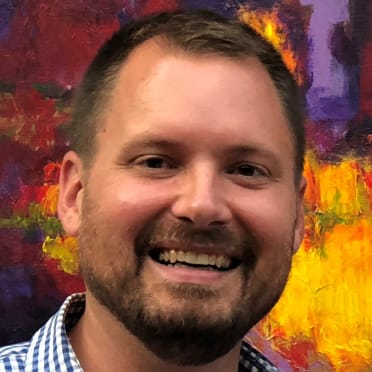Almost 30 years later, Schroeder going strong in booth
PHOENIX -- It’s a milestone year for Bill Schroeder, as the catcher-turned-broadcaster marks his 40th season associated with the Brewers.
Schroeder, born in Baltimore and raised in New Jersey, was Milwaukee’s eighth-round Draft pick in 1979 out of Clemson University, the start of a long career with the Brewers he never could have seen coming. He played 10 seasons in the organization, including parts of six seasons in the big leagues as a backup catcher, and later returned to co-host a postgame radio show for one season before beginning a long tenure as the team’s television analyst. This will be Schroeder’s 29th year in the booth.
“Bob Uecker has, what, 53 years? My 30 is a drop in the bucket going next to him,” Schroeder said. “But I’m proud I was able to last this long.”
Schroeder finished his playing career with the Angels in 1990 and wasn’t sure what to do next, so he returned to Wisconsin to finish his business degree at Carroll University. In ‘94, he picked up some work doing a Sunday sports show on WTMJ-AM, the Brewers’ flagship radio station, with a group of hosts, including Len Kasper, who went on to broadcast games on TV and radio for the Brewers, Cubs and now the White Sox.
That same year, then-GM Sal Bando suggested that Schroeder throw his name into the mix for the Brewers’ TV team. It wasn’t until the start of Spring Training in ‘95 that he got the job, and if the tight timeline to settle into the gig wasn’t pressure enough, the first broadcasts featured unknown replacement players because MLB players were on strike.
“The first two games I ever did were guys who were selling frozen fish,” Schroeder said.
“It was a very interesting situation, but it was still baseball,” said Jim Paschke, Schroeder’s very first play-by-play partner. “What he was learning was the mechanics of being in the booth. The timing, the ebbs and flows. I think it was pretty natural for Bill.”
In those early days, the Brewers aired only a handful of home games on TV. But Schroeder stuck with it, and all these decades later, he’s been doing color analysis through nine Brewers managers, four television networks (Wisconsin Sports Network to Midwest Sports Channel to Fox Sports Net and Fox Sports Wisconsin to Bally Sports Wisconsin) and numerous play-by-play partners, from Paschke to Matt Vasgersian to Daron Sutton to the current mix of Brian Anderson and Jeff Levering, with Kasper, Craig Coshun, Matt Lepay and others filling in along the way.
If Kasper helped Schroeder feel comfortable on the air during those early radio appearances, Schroeder returned the favor a couple of years later when Kasper was starting on TV.
“I’ll never forget: I did the very first game at Miller Park with ‘Rock,’” said Kasper, referring to a 2001 exhibition against the White Sox. “I remember after the first inning, he looked at me and said, ‘Slow down.’
“I’ll never forget that. There were 45,000 people, it was exciting. But it was perfect advice. That’s exactly what I needed, those two words.”
Said Vasgersian: “When I came along, he was the pro and I was the one who was uncomfortable. I was the guy from Triple-A who got the break of a lifetime. I remember vividly his one life lesson for me: ‘Go gently, young bull.’”
For Vasgersian, who was single and on the other side of 30 at the time, it was just the advice he needed to navigate the grind of a Major League season.
Schroeder’s own outlook on the job, on life, on everything changed in 2020 when he came back to work following major offseason heart surgery. He remains eternally grateful for Brewers team physician Dr. Craig Young, who identified an unknown defect in Schroeder’s heart when he went in for a prostate exam and physical. A week later, Schroeder underwent open heart surgery.
The plan was for Schroeder to work a reduced schedule with less travel, but that became moot when the pandemic grounded everyone in place. He’s worked a lighter schedule since then, and will call around 90 games in 2023. He’ll work the opening series at Wrigley Field against the Cubs and then call Brewers home games. Tim Dillard and Vinny Rottino will handle color analysis for most of the other road games.
“It’s not easy to do what Bob and ‘Rock’ are doing,” Paschke said. “A lot of things have to fall into place. The talent has to be there, and there’s luck involved to stay in the same place that long.”
“In this business,” Vasgersian said, “there’s so many egos and there are so many little interpersonal skirmishes that go down along the way. There is none of that with Bill. I mean none of it.”
It’s believed that Schroeder’s contract runs through next season, which would be his 30th in the Brewers’ TV booth.
Then he’ll assess what he wants to do next.
“I asked my father the other day, ‘How long do you think I’ve been doing this?’” Schroeder said. “He was like, ‘Thirteen or 14 years?’ He was shocked when I told him I’m almost at 30. Sometimes I’m shocked I made it past one year. I have some VCR tapes of some of the games I did at the beginning, and oh my God.”
How long did it take him to feel comfortable on the air?
“I’ll tell you next year,” Schroeder said.
